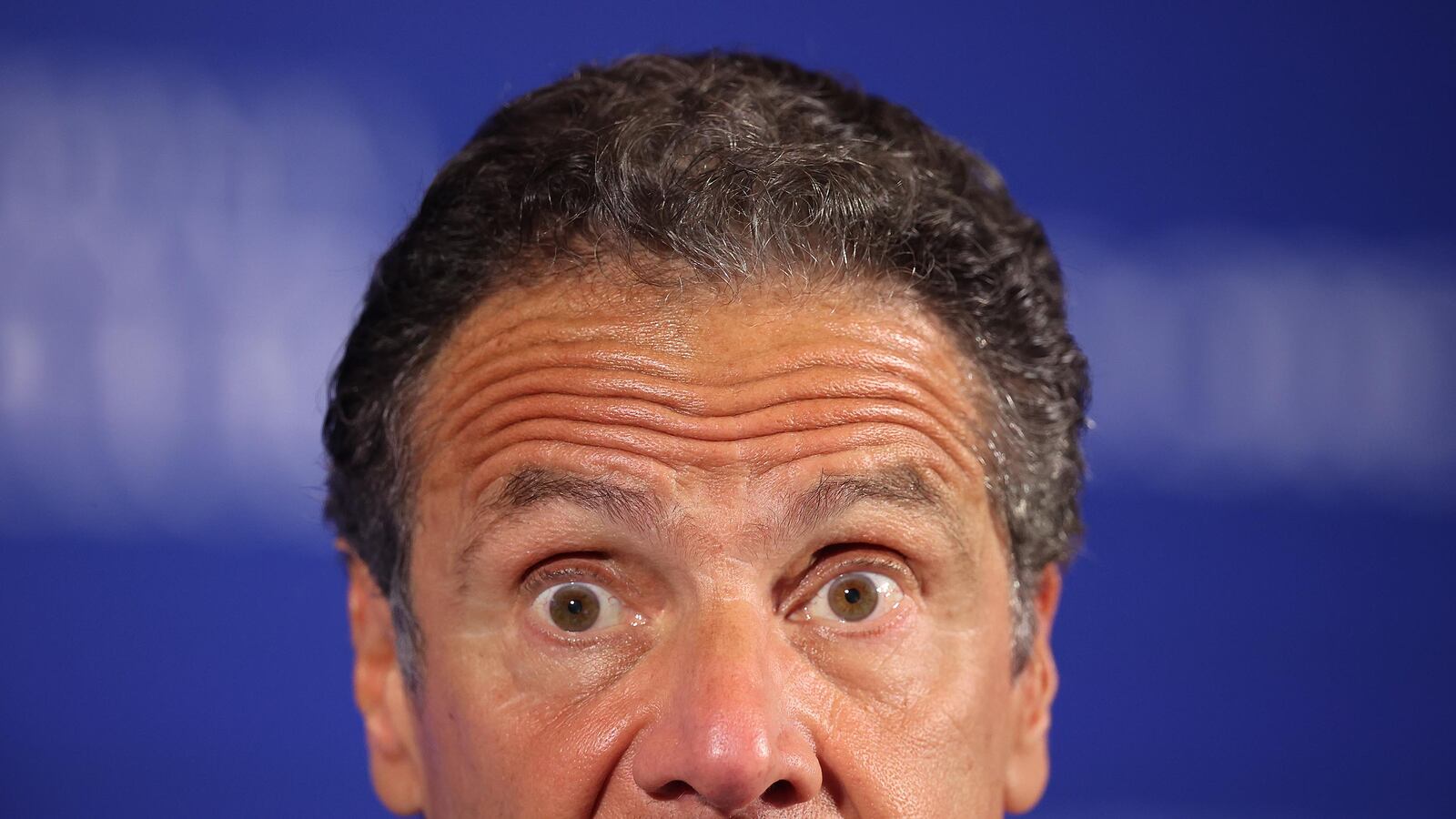“The burden is not on the woman,” Andrew Cuomo told a roomful of people, including me, at NYU in 2015 while promoting New York’s new Enough Is Enough law. “It’s not about, ‘Did the woman say no before she was attacked?’ It’s whether or not the woman said yes.”
Something must have changed in the subsequent years, according to former Cuomo staffer Lindsey Boylan, who says the governor—her boss at the time—kissed her on the mouth after a meeting in 2018, very much without her consent.
At around the same time that Boylan says the governor was sexually harassing her, he was also purchasing Facebook ads bragging that New York’s harassment laws were the strongest in the nation—even as he was refusing to meet with or even acknowledge a group of women who experienced sexual harassment and assault at the hands of his colleagues while working in Albany. Those survivors he ignored formed a working group to call for public hearings on the issue, which Cuomo steadfastly did not support. Instead, he chose to craft his own policy with three other men, one of whom was under investigation for sexual harassment at the time. The hypocrisy is off the charts.
“It’s unclear what Cuomo thinks he has to lose by listening to women who know from experience what loopholes allow New York lawmakers and government officials to avoid consequences for sexual harassment or assault,” I wrote at the time. “Or why he seems so attached to maintaining policies that he’s been told, over and over again, aren’t effective and won’t protect victims.”
I guess it’s a little clearer now?
Boylan detailed her experiences in a Medium essay that landed with a big splash on Wednesday, a few months after tweeting that she’d had a harmful experience while working for the governor but had no desire to get into specifics or speak to reporters about it. According to Boylan, parts of a confidential personnel file about her were leaked to reporters after that.
The treament Boylan details is creepy, whether or not it’s what would be considered “sexual harassment.” The governor summoned her to his office during a party and showed off a cigar box that he said President Bill Clinton gave him. Get it? A signed photograph of the governor appeared in her closed-door office while she was out. He pressured her to accept a job as a “special advisor,” which put her closer to him.
One of the creepiest details was an email showing a Cuomo staffer—his “gatekeeper,” apparently—asking Boylan’s supervisor if she’d be at an event the governor was having the next day, effectively keeping tabs on her whereabouts on the governor’s behalf. (Also not great: Boylan’s male supervisor’s response after explaining she was booked elsewhere. “But it will be hard for her to concentrate on the presentations while worrying about how the Gov’s day is going in Rochester…” I mean, dude. Come on. Gross.)
While the governor’s office has categorically denied Boyland’s claims, what struck me while reading them was how much of it tracked not only with other things I’d heard about Cuomo, but with things done by other abusive men in Albany. For example: Boylan says the governor would call her Lisa, a reference to a rumored former girlfriend that he’d told her, through a female intermediary, that she resembled—only she was prettier, he apparently said. That was something boss pig Vito Lopez did, too: rename people when he felt like it. It’s a remarkable exercise of power, essentially claiming the right and the ability to tear a person down and remake them as the abuser sees fit.
I had heard that Cuomo has a bizarre hatred of fat women; Boylan said he “made unflattering comments about the weight of female colleagues.”
Boylan said the governor “would go out of his way” to touch her lower back, arms and legs; I’d heard about him doing the same to other women, sometimes from the women themselves, but just as often from people who uncomfortably witnessed it.
And the idea that “his inappropriate behavior toward women was an affirmation that he liked you, that you must be doing something right” is stunningly consistent with the behavior of Lopez and others. It’s as if these guys get together and talk about harassment best practices. Well, what I really like to do is break down a woman’s self-esteem.
It’s also striking that this is apparently the only way Cuomo, and a lot of these guys, knows how to interact with female employees. He can’t be a mentor, or a guide, or just a professional boss, equally to everyone, regardless of gender. He has to exert power.
The fallout for Boylan was similar to that experienced by other women whose stories of Albany-based harassment I’ve listened to: constant discomfort and nausea while at work; other women becoming hostile to her; being “reprimanded and told to get in line” by a female Cuomo loyalist, Melissa de Rosa.
At one point, Boylan asks: “What does it say about us when everyone is watching and no one says a thing?” After all, right from the jump, it was her supervisor who told her Cuomo had a crush on her, and a female Cuomo staffer, Stephanie Benton,who wrote in an email: “He said look up Lisa Shields. You could be sisters. Except you’re the better looking sister.”
It can be hard to fathom how people, particularly women, get involved in this sort of thing. Boylan sort of excuses her one-time colleagues, saying, “They’d lose their jobs if they didn’t protect him.” But there are other jobs, aren’t there? Perhaps ones where you don’t have to protect an abusive man, or pass on his comments about your looks?
To be honest, I squirmed when I read the email. I’d received flirtatious emails at work before, and they’d made me smile. They were benign, almost dorky-feeling—things like, “Your hair looked good at the press conference today.” I would laugh and roll my eyes and carry on with my day. Often I knew the person was a flirt in general, that I wasn’t really being singled out so much as added to a roster of female reporters to compliment.
I called a friend, wondering if I was a hypocrite for thinking the Benton email was inappropriate—or, honestly, a bad feminist for having entertained and been entertained by the flirty emails. My friend’s response was immediate: “Was the person who emailed you your boss? Wait, actually, was the person who emailed you someone who also worked for your boss, relaying a message from your boss like he’s some 7th grade kid who doesn’t know how to talk to girls?”
Point taken. Also, burn on the gov. My friend read the intermediary email as pathetic, where I’d read it as a flex, especially because it was sent through a woman. There was the obvious cover of “it can’t be harassment if a woman was involved,” but worse, to me, was the other underlying message it conveys: Who are you going to complain to about me? Everyone belongs to me.
But my friend was right: the issue here wasn’t flirting in the workplace. It was abuse of power.
The sad truth, known by Boylan and anyone else who ever got close enough to Cuomo to have their own story, is that Cuomo’s power in New York State really has been nearly absolute. JCOPE, the ostensible ethics commission that occasionally pretends to care about harassment issues while eagerly retraumatizing victims, was created by and answers to him. He doesn’t just watch the watchmen; he picked them!
I’d always wondered how it could be possible that someone as obsessed with power as Andrew Cuomo hadn’t had a sexual harassment scandal. I thought maybe it was his obsession with power that protected him: he wouldn’t do anything to jeopardize it. But that’s rarely the case with political men who love power, is it?
One of the most telling lines in Boylan’s essay: Cuomo would apparently say that the reasons men get women were “money and power.” What a sad, sorry way to go through life.


